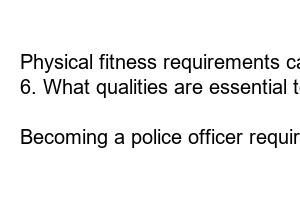경찰이 되는 방법
Title: Your Ultimate Guide on How to Become a Police Officer
Introduction:
Have you ever dreamt of serving your community and upholding justice? Becoming a police officer can be an exciting and rewarding career path. However, the process can seem daunting and mysterious. Worry not! In this comprehensive guide, we will walk you through the steps, qualifications, and preparations required to make your dream of becoming a police officer a reality.
1. Understanding the Role of a Police Officer:
A police officer plays a crucial role in maintaining law and order. They protect lives and property, enforce laws, conduct investigations, and ensure the safety of communities. It is a challenging yet fulfilling career that requires integrity, physical fitness, problem-solving skills, and a commitment to public service.
2. Qualifications and Education:
To qualify for a career in law enforcement, there are certain criteria you need to meet. This includes being a U.S. citizen, possessing a high school diploma or equivalent, and being at least 21 years old. Additionally, some agencies may require a college degree or military service. Meeting these qualifications is essential, as they serve as the foundation for your journey in becoming a police officer.
3. Applying to a Police Academy:
Once you have met the basic qualifications, your next step is to apply to a police academy. This rigorous training program will equip you with the necessary skills, knowledge, and practical experience to handle the responsibilities of a police officer. The application process may include written exams, physical fitness tests, interviews, background checks, and medical evaluations.
4. Preparing for the Academy:
Preparing for the police academy is crucial to maximize your chances of success. Enhance your physical fitness through regular exercise, as the academy’s physical demands can be intense. Strengthen your problem-solving and critical thinking abilities by engaging in community service, volunteering, or pursuing higher education. Familiarize yourself with the *policies and procedures* followed in law enforcement, as this will give you an edge during training.
5. The Road to Graduation:
Congratulations! You have been accepted into the police academy. Now, the real journey begins. The academy training typically consists of both classroom lectures and practical exercises, covering various subjects such as criminal law, self-defense, firearms training, and emergency response. Stay focused, ask questions, embrace teamwork, and embrace the knowledge and guidance offered by experienced instructors.
6. Joining a Law Enforcement Agency:
After successfully completing the police academy, it’s time to enter the exciting world of law enforcement. You can either apply directly to local police departments or explore opportunities at federal agencies such as the FBI or DEA. Research different agencies, understand their hiring processes and requirements, and submit your application with confidence. This is your chance to showcase your commitment, skills, and dedication to serving and protecting the community.
Frequently Asked Questions (FAQs):
1. How long does it take to become a police officer?
The time required varies depending on factors such as the academy’s length, prerequisites, and the hiring process of law enforcement agencies. On average, it could take 6 months to 1 year to complete the necessary steps.
2. Can I become a police officer if I have a criminal record?
Having a criminal record may impact your eligibility to become a police officer. However, each case is evaluated on an individual basis, and some minor offenses may not be disqualifying factors. It is important to be honest about your past during the application process.
3. Is a college degree necessary to become a police officer?
While a college degree is not always required, it can enhance your chances of being hired and may lead to more career advancement opportunities in certain agencies.
4. Do I need prior military experience to become a police officer?
No, prior military experience is not a prerequisite. However, it may provide valuable skills and discipline that can benefit you throughout your law enforcement career.
5. What are the physical fitness requirements for becoming a police officer?
Physical fitness requirements can vary between agencies but typically involve tests of strength, endurance, and agility. Preparing through regular exercise and maintaining a healthy lifestyle is recommended.
6. What qualities are essential to becoming a successful police officer?
Some essential qualities include integrity, good judgment, strong communication skills, critical thinking, empathy, and the ability to work under pressure. Being a team player, having the desire to serve, and a commitment to community safety are also vital.
Summary:
Becoming a police officer requires dedication, discipline, and a genuine desire to make a positive impact on society. By understanding the qualifications, familiarizing yourself with the application process, and preparing for the academy, you can embark on a successful career in law enforcement. Remember, being a police officer is not just a job; it’s a calling to protect and serve your community.

